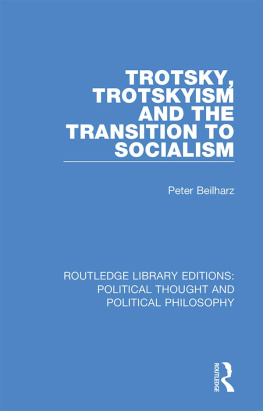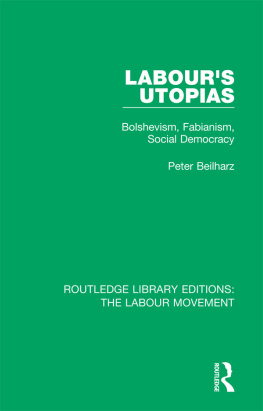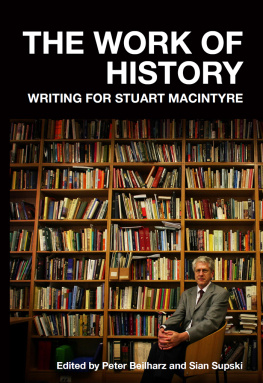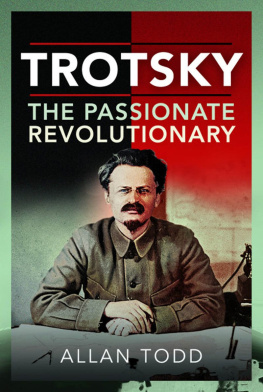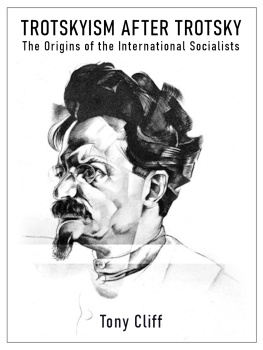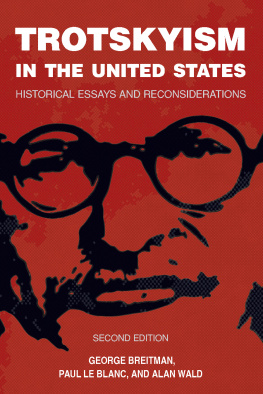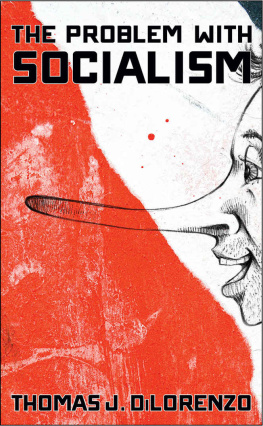First published in 1987 by Croom Helm Ltd
This edition first published in 2020
by Routledge
2 Park Square, Milton Park, Abingdon, Oxon OX14 4RN
and by Routledge
52 Vanderbilt Avenue, New York, NY 10017
Routledge is an imprint of the Taylor & Francis Group, an informa business
1987 Peter Beilharz
All rights reserved. No part of this book may be reprinted or reproduced or utilised in any form or by any electronic, mechanical, or other means, now known or hereafter invented, including photocopying and recording, or in any information storage or retrieval system, without permission in writing from the publishers.
Trademark notice: Product or corporate names may be trademarks or registered trademarks, and are used only for identification and explanation without intent to infringe.
British Library Cataloguing in Publication Data
A catalogue record for this book is available from the British Library
ISBN: 978-0-367-21961-1 (Set)
ISBN: 978-0-429-35434-2 (Set) (ebk)
ISBN: 978-0-367-23058-6 (Volume 4) (hbk)
ISBN: 978-0-429-27816-7 (Volume 4) (ebk)
Publishers Note
The publisher has gone to great lengths to ensure the quality of this reprint but points out that some imperfections in the original copies may be apparent.
Disclaimer
The publisher has made every effort to trace copyright holders and would welcome correspondence from those they have been unable to trace.
1987 Peter Beilharz
Croom Helm Ltd, Provident House, Burrell Row,
Beckenham, Kent BR3 1AT
Croom Helm Australia, 4450 Waterloo Road,
North Ryde, 2113, New South Wales
British Library Cataloguing in Publication Data
Beilharz, Peter
Trotsky, Trotskyism and the transition to socialism.
1. Communism History 20th century
I. Title
335.433 HX40
ISBN 0-7099-3995-7
Phototypeset by Sunrise Setting, Torquay, Devon
Printed and bound in Great Britain by Mackays of Chatham Ltd, Kent
Castoriadis once referred sardonically to Trotskyists as the Stalinist bureaucracy in exile. Trotskyists have long dominated the revolutionary tradition on the Western left, yet their proposals for socialist transition have been largely rhetorical. Trotskyist politics, in default, have effectively become apologetics for Eastern European regimes or else enthusiasms for Central American struggles. Socialism has come, in this tradition, to be identified with victories elsewhere, while the authoritarian excesses of such new regimes are excused as historically necessary. At the same time, it has now become commonplace on the Western left to insist that socialism will be democratic or it will not be at all. There is a growing realisation that the revolutionary tradition is not only mistaken, or misleading: it is also dangerous, and this is evident not only in the arguments of emigres like the Budapest School, but also in the pleas of belated heretics like Poulantzas. Bolshevism ought now to be seen as a problem.
Trotskyism is important because it is part of this problem. Its democratic impulse is weak, and is structured by the Jacobin legacy; this is why Trotskyism is an obstacle to the cause of socialism. The problem with Jacobinism, stated plainly, is that it is a form of politics which seeks human elevation but kills people: it seeks to improve humanity from above, whether they like it or not. It kills people, or justifies murders by others, and then blames History. Bolshevism is an extension of this tradition, and Trotskyism is its most developed theoretical expression. This book examines Trotsky and Trotskyism by analysing the work of Trotsky himself and several major subsequent Trotskyists James, Dunayevskaya, Mandel and Deutscher. Its focus is the question of the transition to socialism, the philosophy of history in Trotskyism, and the hegemony of the Soviet and Jacobin experience within its thinking.
The argument proceeds as follows. Examination of Trotsky, the source, commences with a location of his later, Jacobin, arguments, within his earlier, radical democratic phase, showing that the French Revolution becomes a masterplan for Trotsky only after October. Trotskys philosophical and political economic views are then examined and related to the Second International milieu within which he worked; significantly, Trotsky took on certain positions, and wrote relatively little of a searching nature in either of these major domains. Trotsky was, of course, far more prolific in writing history; his historiography is examined next, and finally his views on transition in East and West are discussed. This sequence philosophy, political economy, historiography, and the generalised interest in transition is then followed into the second part, where the views of his intellectual heirs in philosophy James and Dunayevskaya, in economy Mandel, in historiography Deutscher, are examined and criticised. James and Dunayevskaya are shown to remain more faithful to the democratic but evolutionist aspirations of the younger Trotsky, while Mandel and Deutscher develop in different ways the Jacobin legacy.
There are, then, several themes or purposes in the study. Transition is a theme which runs its whole length. History is also a major theme: the reader more interested in history might begin at . Readers interested in other particular themes like political economy or philosophy could follow a similar procedure, though these chapters, in the first and second parts alike, have a less unitary nature, as they draw together different arguments sometimes from disparate or meagre sources. The justification for this procedure is that more than other works available on Trotskyism, I seek here to engage the tradition as a tradition or field of discourse, and to do this theoretically and politically. Theory underpins historiography, and politics is borne along by it, but neither are often challenged.
This study seeks to better explain Trotskyism as a way of thinking or a form of argument. The object of the study is to show how Trotskyism functions as a political discourse which can be read through its language and metaphor, which are symptomatic of its Jacobinism and the automatic marxism of the Second International. Trotskys work rests on a series of generative and evolutionary metaphors which guarantee socialism and, after 1917, predispose him to Jacobin outcomes. The language of automatic marxism then permeates subsequent Trotskyist argument, emerging in different ways in necessitarian philosophies of history, making the transition to socialism a non-problem. The proposals of Trotskyism for a transition to socialism in the West dissolve when its telos is removed. Even some Trotskyists have now realised the vacuity of their tradition, politically; but they still work within it, by now openly supporting Stalinism as the world-historic revolutionary trend.
Trotskyism, then, is far from exhausted. Its criticism and rejection is one condition upon which socialists must face the future. Socialists must henceforth learn from history, no longer to idolise it.

